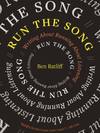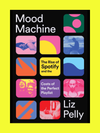With His New Book ‘Run the Song,’ Ben Ratliff Searches for an Eternal Music
The professor and former ‘New York Times’ critic talks about how running and listening can be endless rituals that transcend our era of constant optimization.

Takahashi Kuzan’s Take No Hibiki is not your typical running music. There’s no discernible tempo or arc. It’s quiet. And it’s exceedingly spare. The album features Kuzan—a master of the shakuhachi, a traditional Japanese flute made of bamboo—playing his instrument with slow, painstaking intention. Each trembling note lingers, expressing tenacity and frailty; Kuzan was likely in his 80s when he recorded the album. The music seems more suited to soundtrack a cleansing sound bath than a 10K run.
For Ben Ratliff, whose new book Run the Song reimagines our relationship between running and listening, that’s the whole point. “Music is so much about the breath as the thing that animates or extinguishes a body, and that’s relevant to running,” he tells me, talking about how the sound of Kuzan breathing into the flute pushed him to charge up hills during his regular morning runs in and around the Bronx. “As I run, I’m listening for life force, and I definitely find it there.”
Now in his mid-50s and a professor at New York University, Ratliff has made a full career out of that search for musical vitality. He grew up on hardcore punk before becoming an authority in the world of jazz, publishing a guide to the genre (which I have personally referred to countless times) in 2002. Between 1996 and 2016, he was a music critic at The New York Times, where he covered everything from ZZ Top to Lady Gaga to jazz pianist Jason Moran. His expertise is dauntingly wide and deep, though his writing is always welcoming, never aloof. With his 2017 book Every Song Ever, Ratliff combated the ways streaming algorithms prohibit our curiosity by merely serving us more of what we already like; it presented a path to opening up our ears to find the less obvious, but more rewarding, connections between the loudness of Red Hot Chili Peppers and Little Richard, or the speed of Bud Powell and Outkast.
Run the Song is imbued with a similar spirit as it breaks down the music of everyone from Beethoven to Sade to Ice Spice to the DJ and producer Theo Parrish, and how such sounds fit into Ratliff’s regular practice of running. Unlike almost every other book about running, this one doesn’t offer tips to perfect your stride or break personal records. (“I can’t stand runner’s magazines,” Ratliff writes.) Its aims are more meaningful than that, more philosophical. “Here is the runner I propose: enthusiastic but with no claim to expertise,” he offers early in the book. “If there is a way to run nearly every day without being an athlete, I’m going to find it.” Listening is intrinsic to that quest.
At its core, Run the Song is a brilliant example of the power—and necessity—of music criticism, coming at a time when the form feels especially endangered. One of Ratliff’s superpowers as a writer is his way with description of sound and style. To pick one example out of hundreds, here’s Ratliff on the way jazz drummer Ed Blackwell used his cymbals: “there but almost not there, his hi-hat swing on the two and four, his unforced maintenance on the ride cymbal, as if he were watering it, maybe while looking the other way.” Even if you’ve never heard of Blackwell, that image of casual mastery still cuts through.
There’s also an ethical framework embedded in the book, one that moves beyond the trappings of hyper-consumerism and derides the way technology attempts to extinguish our humanity. On Alice Coltrane, he writes, “All her music carries a drift not of commerce or entertainment but of daily practice.” For Ratliff, this is the highest of compliments. In our conversation below, the writer talks about how Run the Song came to be, how his listening habits have changed over the years, and his ongoing quest for musical endlessness.





